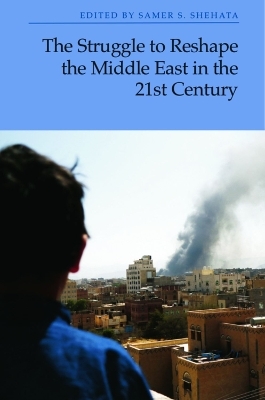
The Struggle to Reshape the Middle East in the 21st Century
Seiten
2023
Edinburgh University Press (Verlag)
978-1-3995-1822-2 (ISBN)
Edinburgh University Press (Verlag)
978-1-3995-1822-2 (ISBN)
The volume examines the causes and consequences of regional turbulence in the Middle East following the 2003 Iraq war and the 2011 Arab uprisings. ?
Examines how regional turbulence following the 2003 Iraq war and the 2011 Arab uprisings impacted domestic politics and regional policies of key states in the Middle East
Contains detailed case studies based on original research and analysis by leading Middle East scholars
Engages with the Middle East domestic politics and Middle East international relations scholarship
Critically examines US policy toward the Middle East under Obama and Trump
Reinterprets Israel's role within the Middle East regional order
Examines Turkey's foreign policy toward the Syria crisis
Explores of Iranian national security thinking and policy toward the Syria crisis
Analyses of increased regional rivalry on the Gulf Cooperation Council and relations between member states
Critiques international and regional discourses justifying intervention in Yemen and assessment of consequences
Presents original research based on interviews examining role of regional actors in Egypt's 'failed democratisation'
Re-evaluates the failure of Al Qaeda in Iraq and Syria
Provides the first analysis of foreign policy orientation of the new Salafi parties in the region
The volume examines the causes and consequences of regional turbulence in the Middle East following the 2003 Iraq war and the 2011 Arab uprisings. The Middle East has experienced unprecedented levels of instability and violence during this period including regime breakdown, heightened rivalry and competition, civil and proxy wars, cross border military intervention, refugee flows, and the emergence of violent non-state actors.
Following a theoretical chapter analysing the drivers of regional turbulence, leading Middle East scholars investigate the impact of turbulence on the politics of different states and actors in the region. 9 case studies analyse the foreign policies and regional role of the United States and Israel, Iran and Turkey's policies toward the Syrian crisis, and the impact of regional turbulence and intervention on Yemen, Egypt and relations among Arab Gulf states. The two final chapters examine two new Islamist actors that emerged in the Middle East during this period: Sunni militant groups in Iraq and Syria and the new Salafi political parties and their foreign policy orientations.
Examines how regional turbulence following the 2003 Iraq war and the 2011 Arab uprisings impacted domestic politics and regional policies of key states in the Middle East
Contains detailed case studies based on original research and analysis by leading Middle East scholars
Engages with the Middle East domestic politics and Middle East international relations scholarship
Critically examines US policy toward the Middle East under Obama and Trump
Reinterprets Israel's role within the Middle East regional order
Examines Turkey's foreign policy toward the Syria crisis
Explores of Iranian national security thinking and policy toward the Syria crisis
Analyses of increased regional rivalry on the Gulf Cooperation Council and relations between member states
Critiques international and regional discourses justifying intervention in Yemen and assessment of consequences
Presents original research based on interviews examining role of regional actors in Egypt's 'failed democratisation'
Re-evaluates the failure of Al Qaeda in Iraq and Syria
Provides the first analysis of foreign policy orientation of the new Salafi parties in the region
The volume examines the causes and consequences of regional turbulence in the Middle East following the 2003 Iraq war and the 2011 Arab uprisings. The Middle East has experienced unprecedented levels of instability and violence during this period including regime breakdown, heightened rivalry and competition, civil and proxy wars, cross border military intervention, refugee flows, and the emergence of violent non-state actors.
Following a theoretical chapter analysing the drivers of regional turbulence, leading Middle East scholars investigate the impact of turbulence on the politics of different states and actors in the region. 9 case studies analyse the foreign policies and regional role of the United States and Israel, Iran and Turkey's policies toward the Syrian crisis, and the impact of regional turbulence and intervention on Yemen, Egypt and relations among Arab Gulf states. The two final chapters examine two new Islamist actors that emerged in the Middle East during this period: Sunni militant groups in Iraq and Syria and the new Salafi political parties and their foreign policy orientations.
Samer S. Shehata is the Colin Mackey and Patricia Molina de Mackey Associate Professor of Middle East Studies at David L. Boren College of International Studies, University of Oklahoma. He is also the author of Shop Floor Culture and Politics in Egypt (2009) and editor of Islamist Politics in the Middle East: Movements and Change (2012).
| Erscheinungsdatum | 02.05.2023 |
|---|---|
| Zusatzinfo | 2 B/W illustrations 2 black and white illustrations |
| Verlagsort | Edinburgh |
| Sprache | englisch |
| Maße | 156 x 234 mm |
| Themenwelt | Geisteswissenschaften ► Geschichte ► Allgemeine Geschichte |
| Geisteswissenschaften ► Geschichte ► Regional- / Ländergeschichte | |
| Sozialwissenschaften ► Politik / Verwaltung ► Europäische / Internationale Politik | |
| Sozialwissenschaften ► Politik / Verwaltung ► Vergleichende Politikwissenschaften | |
| ISBN-10 | 1-3995-1822-4 / 1399518224 |
| ISBN-13 | 978-1-3995-1822-2 / 9781399518222 |
| Zustand | Neuware |
| Haben Sie eine Frage zum Produkt? |
Mehr entdecken
aus dem Bereich
aus dem Bereich
eine Familiengeschichte der Menschheit
Buch | Hardcover (2023)
Klett-Cotta (Verlag)
49,00 €
Eine wahre Geschichte von Schiffbruch, Mord und Meuterei
Buch | Hardcover (2024)
C.Bertelsmann (Verlag)
25,00 €


